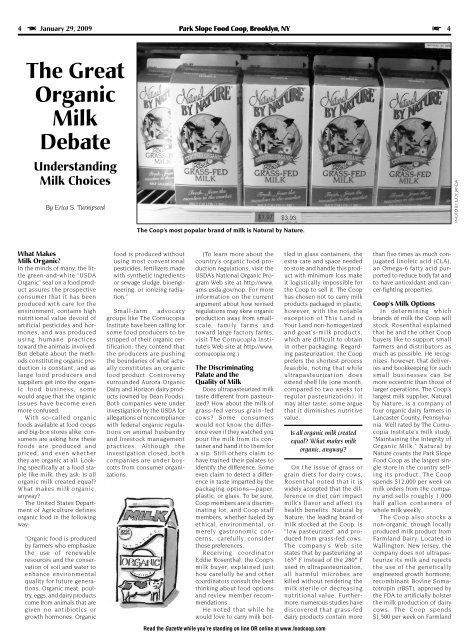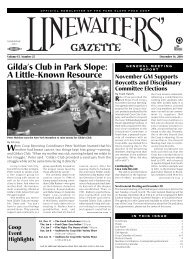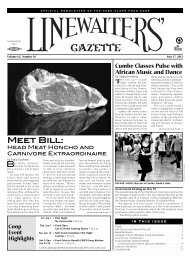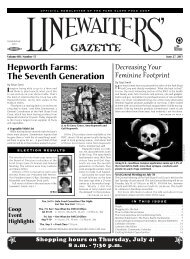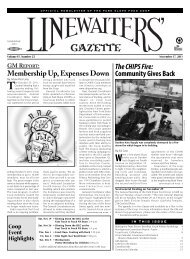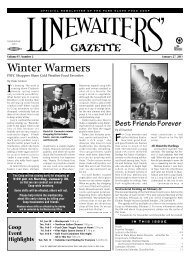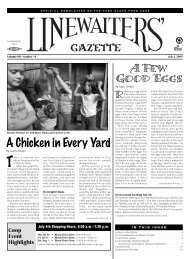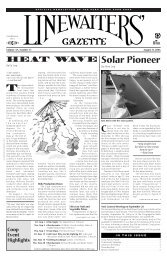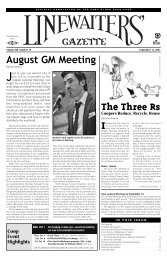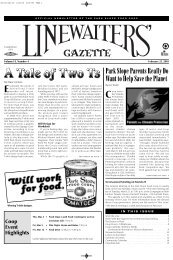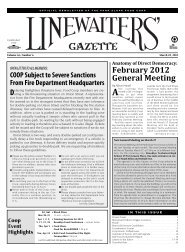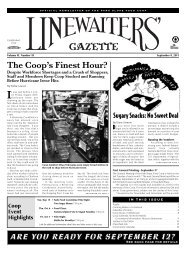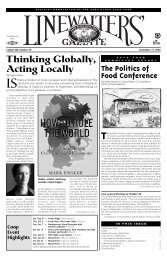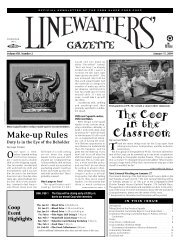Real Pickles: More Than Just a Pickle - Park Slope Food Coop
Real Pickles: More Than Just a Pickle - Park Slope Food Coop
Real Pickles: More Than Just a Pickle - Park Slope Food Coop
- No tags were found...
Create successful ePaper yourself
Turn your PDF publications into a flip-book with our unique Google optimized e-Paper software.
09-01-29 p1-16 2/18/09 5:20 PM Page 44 January 29, 2009 <strong>Park</strong> <strong>Slope</strong> <strong>Food</strong> <strong>Coop</strong>, Brooklyn, NY 4The GreatOrganicMilkDebateUnderstandingMilk ChoicesBy Erica S. TurnipseedPHOTO BY JUDY JANDAThe <strong>Coop</strong>’s most popular brand of milk is Natural by Nature.What MakesMilk Organic?In the minds of many, the littlegreen-and-white “USDAOrganic” seal on a food productassures the prospectiveconsumer that it has beenproduced with care for theenvironment, contains highnutritional value devoid ofartificial pesticides and hormones,and was producedusing humane practicestoward the animals involved.But debate about the methodsconstituting organic productionis constant, and aslarge food producers andsuppliers get into the organicfood business, somewould argue that the organicissues have become evenmore confused.With so-called organicfoods available at food coopsand big-box stores alike, consumersare asking how thesefoods are produced andpriced, and even whetherthey are organic at all. Lookingspecifically at a food staplelike milk, they ask: Is allorganic milk created equal?What makes milk organic,anyway?The United States Departmentof Agriculture definesorganic food in the followingway:“Organic food is producedby farmers who emphasizethe use of renewableresources and the conservationof soil and water toenhance environmentalquality for future generations.Organic meat, poultry,eggs, and dairy productscome from animals that aregiven no antibiotics orgrowth hormones. Organicfood is produced withoutusing most conventionalpesticides, fertilizers madewith synthetic ingredientsor sewage sludge, bioengineering,or ionizing radiation.”Small-farm advocacygroups like The CornucopiaInstitute have been calling forsome food producers to bestripped of their organic certification;they contend thatthe producers are pushingthe boundaries of what actuallyconstitutes an organicfood product. Controversysurrounded Aurora OrganicDairy and Horizon dairy products(owned by Dean <strong>Food</strong>s).Both companies were underinvestigation by the USDA forallegations of noncompliancewith federal organic regulationson animal husbandryand livestock managementpractices. Although theinvestigation closed, bothcompanies are under boycottsfrom consumer organizations.(To learn more about thecountry’s organic food productionregulations, visit theUSDA’s National Organic ProgramWeb site at http://www.ams.usda.gov/nop. For moreinformation on the currentargument about how revisedregulations may skew organicproduction away from smallscale,family farms andtoward large factory farms,visit The Cornucopia Institute’sWeb site at http://www.cornucopia.org.)The DiscriminatingPalate and theQuality of MilkDoes ultrapasteurized milktaste different from pasteurized?How about the milk ofgrass-fed versus grain-fedcows? Some consumerswould not know the differenceeven if they watched youpour the milk from its containerand hand it to them fora sip. Still others claim tohave trained their palates toidentify the difference. Someeven claim to detect a differencein taste imparted by thepackaging options—paper,plastic, or glass. To be sure,<strong>Coop</strong> members are a discriminatinglot, and <strong>Coop</strong> staffmembers, whether fueled byethical, environmental, ormerely gastronomic concerns,carefully considerthose preferences.Receiving coordinatorEddie Rosenthal, the <strong>Coop</strong>’smilk buyer, explained justhow carefully he and othercoordinators consult the bestthinking about food optionsand review member recommendations.He noted that while hewould love to carry milk bottledin glass containers, theextra care and space neededto store and handle this productwith minimum loss makeit logistically impossible forthe <strong>Coop</strong> to sell it. The <strong>Coop</strong>has chosen not to carry milkproducts packaged in plastic,however, with the notableexception of This Land isYour Land non-homogenizedand goat’s-milk products,which are difficult to obtainin other packaging. Regardingpasteurization, the <strong>Coop</strong>prefers the shortest processfeasible, noting that whileultrapasteurization doesextend shelf life (one month,compared to two weeks forregular pasteurization), itmay alter taste; some arguethat it diminishes nutritivevalue.Is all organic milk createdequal? What makes milkorganic, anyway?On the issue of grass orgrain diets for dairy cows,Rosenthal noted that it iswidely accepted that the differencein diet can impactmilk’s flavor and affect itshealth benefits. Natural byNature, the leading brand ofmilk stocked at the <strong>Coop</strong>, is“low pasteurized” and producedfrom grass-fed cows.The company’s Web sitestates that by pasteurizing at165° F instead of the 280° Fused in ultrapasteurization,all harmful microbes arekilled without rendering themilk sterile or decreasingnutritional value. Furthermore,numerous studies havediscovered that grass-feddairy products contain morethan five times as much conjugatedlinoleic acid (CLA),an Omega-6 fatty acid purportedto reduce body fat andto have antioxidant and cancer-fightingproperties.<strong>Coop</strong>’s Milk OptionsIn determining whichbrands of milk the <strong>Coop</strong> willstock, Rosenthal explainedthat he and the other <strong>Coop</strong>buyers like to support smallfarmers and distributors asmuch as possible. He recognizes,however, that deliveriesand bookkeeping for suchsmall businesses can bemore eccentric than those oflarger operations. The <strong>Coop</strong>’slargest milk supplier, Naturalby Nature, is a company offour organic dairy farmers inLancaster County, Pennsylvania.Well rated by The CornucopiaInstitute’s milk study,“Maintaining the Integrity ofOrganic Milk,” Natural byNature counts the <strong>Park</strong> <strong>Slope</strong><strong>Food</strong> <strong>Coop</strong> as the largest singlestore in the country sellingits product. The <strong>Coop</strong>spends $12,000 per week onmilk orders from the companyand sells roughly 1,000half gallon containers ofwhole milk weekly.The <strong>Coop</strong> also stocks anon-organic, though locallyproduced milk product fromFarmland Dairy. Located inWallington, New Jersey, thecompany does not ultrapasteurizeits milk and rejectsthe use of the geneticallyengineered growth hormone,recombinant Bovine Somatotropin(rBST), approved bythe FDA to artificially bolsterthe milk production of dairycows. The <strong>Coop</strong> spends$1,500 per week on FarmlandRead the Gazette while you’re standing on line OR online at www.foodcoop.com


